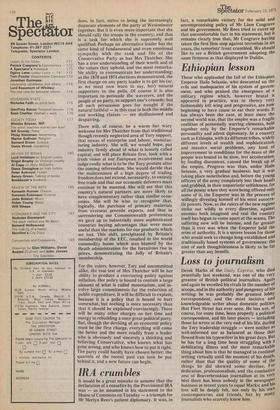Ethiopian lesson
Those who applauded the fall of the Ethiopian Emperor Haile Selassie, who descanted on the evils and inadequacies of his system of government, and who praised the emergence of a military regime which, however brutal it appeared in practice, was in theory very fashionably left wing and progressive, are now beginning to have cause to eat their words. It has always been the case, at least since the second world war, that the empire was a fragile coalition of potentially warring elements, held together only by the Emperor's remarkable personality and adroit diplomacy. In a country such as Ethiopia, with its different tribes, widely different levels of wealth and sophistication, and massive social problems, any kind of improvement in conditions for the mass of the people was bound to be slow, lest acceleration, by feeding discontent, caused the break up of the empire. Progress was thus, under Haile Selassie, a very gradual business: but it was taking place nonetheless and, before the young officers of the army completely lost their heads and grabbed, in their unpatriotic selfishness, for all the power when they were being offered only some of it, the Emperor was in the process of willingly divesting himself of his most autocratic powers. Now, as the rulers of the new regime strike out wildly in every direction, against enemies both imagined and real the country itself has begun to come apart at the seams. The suffering now will be intense, and far greater than it ever was when the Emperor held the reins of authority. It is a severe lesson for those who would seek to change long-established and traditionally based systems of government: the cost of such thoughtlessness is likely to be far greater than any benefit.


























 Previous page
Previous page